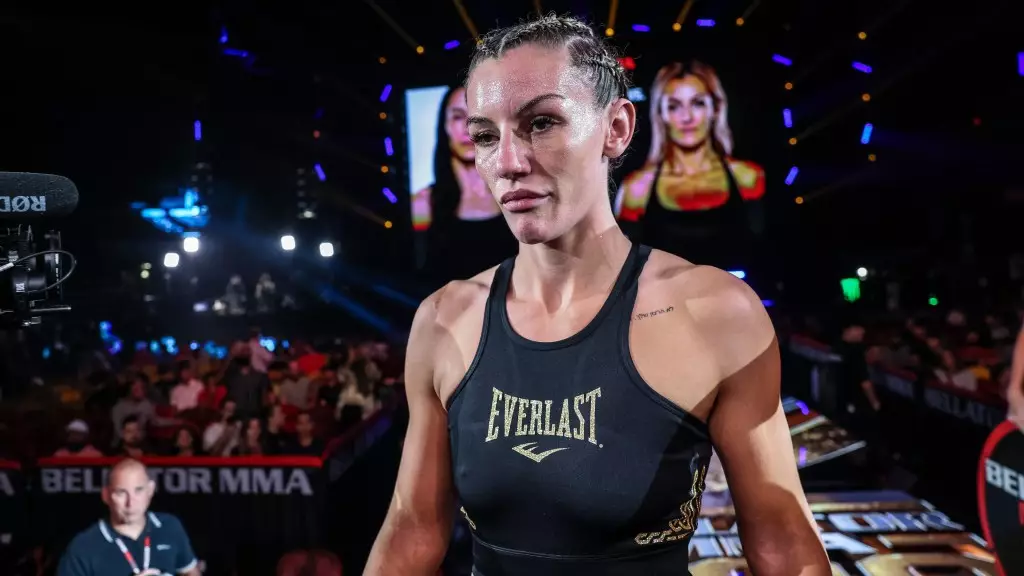Leah McCourt is making significant waves in the world of women’s MMA, especially as she prepares for her bout against Sara Collins, which has been dubbed a No. 1 contender fight. The anticipation surrounding their match-up is palpable, and yet McCourt’s demeanor hints at frustration and a weary acknowledgment of the familiar narrative that’s been spun around her career trajectory. With her recent success, it seems she should be more excited; instead, she exhibits a mix of confidence and cynicism that reveals much about the pressures athletes face within the sport.
McCourt made headlines last October when she decisively finished Sara McMann in the first round at Bellator 300, solidifying her position as a top contender in the women’s featherweight division. Following that victory, she took the stage for a face-off with Cris Cyborg, the reigning champion, but since then, the anticipated match-up between them has been delayed. McCourt’s palpable frustration is indicative of an athlete that has been strung along with promises of opportunity, highlighting a key issue within the realm of professional combat sports: the discrepancy between a fighter’s capabilities and the opportunities afforded to them.
While McCourt should be riding high on the success of her performance, the reality of the situation is more complicated. She feels the weight of unfulfilled expectations, knowing that the most significant fight of her career remains an unresolved possibility. It’s a situation that leaves her in an uncomfortable limbo, forcing her to refocus her emotions and energy into her upcoming fight with Collins. The intensity of this internal struggle can often materialize in the cage and could significantly influence the outcome of her battles.
In combat sports, such as MMA, mental fortitude is as critical as physical preparation. McCourt believes that her extensive experience in high-pressure situations has equipped her with the tools to succeed against Collins. She outlines how she has consistently found herself in challenging circumstances, while Collins has fought in less pressure-filled scenarios, presenting an interesting psychological advantage for McCourt.
The Clash of Styles and Dynamics
As McCourt compares herself to Collins, she points out that Collins seems unaccustomed to the relentless pace she brings to her fights. The upcoming bout represents more than just a scrap for positioning in the division; it embodies a clash of styles and mentalities. McCourt’s confidence in her high-paced fighting style is evident, asserting that she thrives under pressure whereas her opponent may falter when it truly counts.
The dynamics between the fighters will be paramount in determining the fight’s outcome. McCourt’s assessment of Collins as “extremely tough” signifies her respect for her opponent’s skills, yet she is adamant that her own experience and capacity to handle pressure will give her the edge. This delicate balance of respect and self-assuredness may be crucial as fight night approaches.
Future Aspirations: Cyborg or Bust?
Like any fighter driven by ambition, McCourt has unequivocal aspirations of challenging for the women’s featherweight title. Her longing to face Cyborg is clear, as she considers the champion to be the embodiment of excellence in the sport—a test she relishes. Herein lies the heart of McCourt’s struggle: she is on the brink of greatness, yet the title belt still eludes her. With every victory, the pathway appears clearer, but the looming shadow of unfulfilled promises continues to linger.
The anticipation ahead of her fight on Saturday is tinged with a hint of skepticism. McCourt’s reliance on the outcome against Collins to secure a title shot speaks to the fraught nature of professional MMA, where an individual’s fate can hinge upon the results of a single night in the octagon. The irony lies in the fact that despite her outstanding skills and achievements, she finds herself waiting for validation through circumstances largely outside her control.
As the fight approaches, Leah McCourt stands on the precipice of opportunity. Victory against Collins could catalyze her ascent to face Cyborg, but the journey highlights broader issues within the sport regarding management decisions, fight promotions, and the reality that often rewards the loudest voices rather than the most deserving fighters. Whether she secures her ambitions or faces further obstacles, McCourt’s story is one of resilience and determination—a reminder of the personal battles that lie behind every high-stakes clash in the cage.

